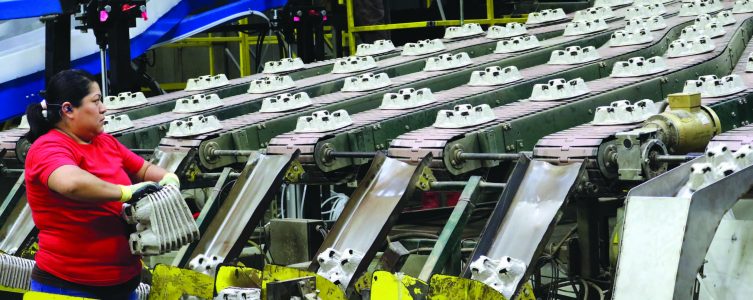
A major manufacturer of egg flats and fast-food drink carriers has turned to CIRAS for help with the next phase of improving its business.
Clarion Packaging—a 100-employee plant in Clarion, Iowa, with a sister facility in Brook, Indiana—first approached CIRAS roughly two years ago for help achieving food safety certification. The company now is working with CIRAS to test its product quality and plan for the future.
Founded in 2006, Clarion makes egg flats—the open-faced cartons that producers use to transport eggs in bulk—by mixing water with recycled paper and pressing the resulting pulp into a mold. The company uses a similar process to produce 85 million four-cup drink carriers a year for a major chain of fast-food restaurants.
Last year, Clarion turned to CIRAS for help understanding its egg flats. CIRAS experts used x-rays and an electron microscope to examine samples from both Indiana and Iowa. Results showed stronger, more uniform fibers in the Iowa samples, which also held up better in specially arranged crush tests.
“They could perceive that there was a difference in quality, but they didn’t know why,” said CIRAS account manager Derek Thompson. “It turns out that Indiana is using more cardboard” mixed in with the recycled paper.
Clarion plant manager Damond Roberts credits the disparity to “contaminants” in the recycled newspaper available in Indiana. The Indiana plant, which CIRAS helped connect with experts there via the MEP National Network (see story page 3), since has changed its production process. CIRAS experts now are reevaluating that change. Soon, they’ll start discussing the future of Clarion’s manufacturing process and whether the company should shift to new materials.
“The recycled paper’s not always going to be there,” Roberts explains. “What we’re looking for is the best substitute out there. . . . Because of this, you eventually could see a big shift in our industry.”
Clarion has estimated that stabilizing the quality of its products across both plants will be worth roughly $1.75 million to the company annually. The impact of a new fiber source is not yet known.
Roberts, for his part, finds value in the way CIRAS has helped Clarion begin making evidence-based decisions.
“One of the restrictions we have in getting better is just the fact that there’s not a lot of expert knowledge out there,” Roberts said. “Being able to use the resources of the university has let us use analytics to make sure that what we’re doing is correct.”
> For more information, contact Derek Thompson at thompson@iastate.edu or 515-419-2163.
A version of this article was published in the Fall 2017 edition of CIRAS News. To read more of that edition or others, please explore elsewhere on our website.